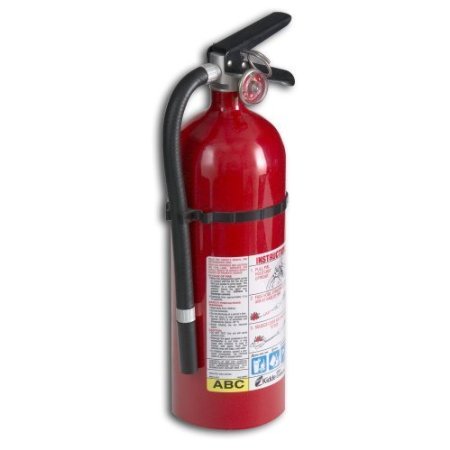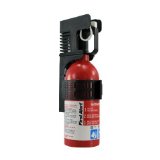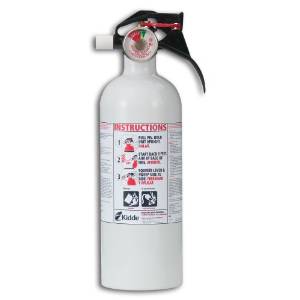How To Choose Fire Extinguishers For Every Location And Occasion
Fire extinguishers are one of the most overlooked tools that can play a large role in your personal safety as well as the safety of others around you. Even for those individuals who own an extinguisher, they may not have the most effective type for the location in which they keep it stored. After all, there are a variety of extinguishers to go along with the many places that you should keep one to ensure that you and your family remain safe. Here we will take a look at the places you should consider keeping a fire extinguisher as well as what type of extinguisher would best suit your needs in each area.
Fire Extinguisher Basics:
Fire extinguishers come with three different values that are rated on each extinguisher. The “A” value conveys the ability of the extinguisher to put out fires caused by dry goods such as wood or paper. The “B” value is the rating for the extinguisher to put out fires that are fueled by oil-based materials such as oil, gas, or grease. The “C” value will not be a rating; its presence or absence indicates whether or not the fire retardant conducts electricity; which is important for putting out electrical fires.
1. Your Home
While it may seem like common sense to keep a fully charged fire extinguisher in your home, there are estimates that over fifty percent of homes do not have one. Aside from protecting your property and preventing the flames from spreading while you wait on emergency services, a fire extinguisher can help you clear a path to safety in the event of a fire.
One of the most common areas for fires to occur in the home is the kitchen. Many times this involves grease or similar fatty oils which cannot be put out by water. For this reason you should obtain a fire extinguisher that has a high value in the “B” section on the ABC label. A high “B” value means that the extinguisher is most useful on flammable liquids, and can certainly put out an oil-based fire.
2. The Family Vehicle
Another area that is often overlooked when it comes to fire preparedness is in a vehicle. Being that they are packed with flammable liquids and run at incredibly high temperatures, it only makes sense to keep an extinguisher in your vehicle. Two of the most common ways that fires occur is through foreign objects, such as leaves, being ignited under the hood and catastrophic failure and release of liquids as a result of a collision.
Once a fire has been lit as a result of either one of these situations, it is imperative to put the flames out as quickly as possible. A fire can quickly spread to the brake fluid, oil, and gasoline in a vehicle resulting in injuries, explosions, property loss, and even death. If you have a fire extinguisher in your car, then you can douse the flames before they spread too far, or even save the life of someone trapped in a car if you happen to come upon an accident.
The extinguisher that you will want for this type of situation is one that has a high “B” rating, above 40, and a 4 “A” rating. This will allow you to put out fires that involve dry materials as well as oil-based fires, such as those fueled by gasoline.
The same concept applies for RVs as well, except that it is a good idea to keep two extinguishers in the vehicle: one for fires in the kitchenette and one for problems under the hood.
3. On A Boat
There are not many situations that can be considered as dire as being aboard a boat that has caught fire. If you are on the open ocean, on a fishing trip perhaps, there is nowhere to go but into the water if the vessel becomes engulfed. Having a fire extinguisher available can buy you valuable time as you await rescue or help from another vessel.
When it comes to the type of extinguisher that you should consider having on board a boat, it is better to have an extinguisher for both dry materials as well as oil-based materials, one of which should not conduct electricity. This means that you should have one with a high “A” rating as well as one with a high “B” rating; one of which needs a “C’ denotation. It is important to be able to put out fires of all types on a boat without running the risk of short-circuiting electrical systems which can impede your ability to call for help.
Discover more from Tom's Take On Things
Subscribe to get the latest posts sent to your email.



Wow, it didn’t even cross my mind to put a fire extinguisher in my car! It would be nice to have that back up in case my car is on fire from an accident. Or it could even be used if the car is overheating. Having a fire extinguisher in my car would make me feel much more safe knowing that if the car was on fire, I could protect myself and others from the flames.
I know a fire extinguisher is kind of an optional safety tool, but why wouldn’t you want one? I agree that having one in the right location can make a big difference in the safety of your family and home. I had no idea that you could keep a small fire extinguisher in your car. I’ll definitely have to look into that option. Thanks!
What a great article! Thank you! We keep two extinguishers in our house: kitchen and laundry room, one in each car also. What I never knew was even though you have an ABC extinguisher, I never realized each letter had a certain rating. I always thought ABC just covered it all!! Now I will go check mine! Thanks again, very informative.